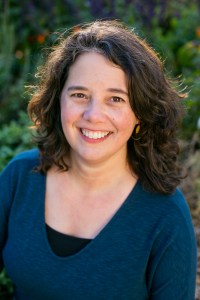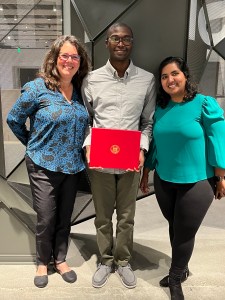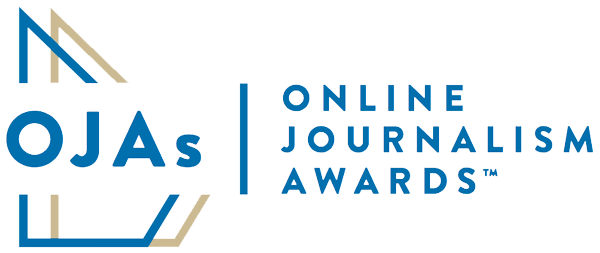
The Open Notebook community members posed for a “family photo” at the annual ScienceWriters meeting in October 2022. The group includes people who have been mentees, mentors, writers and editors at TON.
We recently had the opportunity to catch up with 2023 ONA Community Award recipient Siri Carpenter about the values and approach that ground her community building work.
Siri is Co-Founder and Editor-in-Chief of The Open Notebook (TON), a nonprofit organization on a mission to help journalists improve their skills in covering science, health, technology and the environment. As Siri shared with ONA, TON’s collection of online resources has reached tens of thousands of journalists in almost every country in the world over the past 13 years, while articles translated through the TON en Español program has reached over 15,000 people. TON also offers free online courses that have served more than 7,000 attendees, a competitive early-career fellowship program and a newly launched Science Writers Database that has approved over 1,000 entries in just a few days.
Read on to learn more about how TON has catalyzed positive change for science journalism and for Siri’s advice for aspiring community builders in journalism.

Siri Carpenter. (Photo by Beth Skogen Photography)
I was working toward my Ph.D. in social psychology when I discovered that the field of science writing existed. I immediately sensed that that’s what I wanted to do. My initial forays into journalism were through internships — first with the American Association for the Advancement of Science Mass Media Fellowship program, through which I spent a summer working as a reporter for the Richmond Times-Dispatch in Virginia; and then with an internship at Science News magazine. I was very fortunate to have some spectacular mentors early on, during those internships and in my first job.
But then, while I was still a very early-career journalist, my husband and I decided to move back to Madison, Wisconsin, to be closer to our families, and I started freelancing. Suddenly I felt that when it came to continuing to learn how to be a good journalist, I was very much on my own. I hadn’t gone to journalism school, and I didn’t know many people in journalism, and I was working all alone in my attic, trying to figure out the profession and my place in it. In many ways, The Open Notebook is what I might have wished existed for me when I was starting out.
A huge part of our mission is making sure anyone who comes to TON feels included, represented, and served by the work that we do.
For this reason, inclusion is front and center in every facet of TON’s operations, from story selection, sourcing, and editing to hiring to program design and development. Our articles and programs include offerings appropriate for diverse groups of science journalists all over the world, from aspiring to experienced, as well as local and general-assignment reporters who might not think of science or health or environmental reporting as their beat. We also serve editors who are the “gatekeepers” of science journalism.
We are also committed to advancing diversity, equity and inclusion in science journalism. One of the ways we do this is by publishing articles that examine the experiences, expertise, and perspectives of science journalists from communities that are underrepresented in science journalism. We now have 30+ articles in our Diverse Voices in Science Journalism series, published in partnership with the National Association of Science Writers Diversity Committee and supported by the Simons Foundation. The collection includes stories about reporting on trans youth health care, expanding the geographical borders of your source list, eliminating ableist language, and more.
We emphasize source diversity in everything we publish to ensure that the guidance we provide is informed by diverse perspectives and experiences. We recently established a group of eight paid advisors in Latin American countries who have agreed to assist our writers who are looking for LatAm sources.

Siri Carpenter (left) and The Open Notebook board member Shraddha Chakradhar attended Abdullahi Tsanni’s graduation from MIT’s Graduate Program in Science Writing. Abdullahi was an early-career fellow at The Open Notebook in 2021.
We also foster community through multiple mentoring programs:
Finally, we believe that accessibility is a key aspect of inclusion, so that’s why all our articles, translations, courses, and mentoring programs are free to anyone, anywhere in the world. And when we do charge for something, we offer a very steep discounted registration that people can opt into if their financial circumstances require.
I think a big part of cultivating a sense of belonging is about making that a priority in everything we do — as I once heard someone put it, it’s a practice, not a program. The top item on my job description — which our board of directors and I created together — is “Foster and support a culture of inclusion in all of The Open Notebook’s programs and communities.” So that value is baked into the way I and our whole team think about every aspect of our work, from our mentoring practices to the way we frame our articles to our policies for paying contributors.
A key thing here is being willing to put our money where our mouths are. To take one example, we’ve made the choice to invest a lot of resources in mentoring, not just through our formal mentoring programs but also through our editorial process. We work with a lot of very early-career journalists who may not have had access to much formal training. It would be so much easier, and cheaper, for us to simply always hire more experienced writers, which would likely mean spending fewer resources on editing. But we’ve resisted doing that because we so badly want the diversity of perspectives and voices that comes from working with a much broader range of writers.
There is no future of journalism without community. As traditional newsrooms dwindle in number and size, journalists must report on increasingly complicated issues with less and less support. Journalists need the support of their colleagues to produce quality work that is equally incisive and sensitive without burning out. When structured well—with an eye toward inclusion and belonging—community spaces can offer journalists a sense of guidance and encouragement as they do their work. And as journalists receive support from a community, they’re likely to pour back into that community as well, creating a thriving, sustainable environment.

Two of The Open Notebook’s current early-career fellows, Humberto Basilio and Giuliana Viglione, recently met up in person when they were both visiting New York City.
Well, first I would say that I encourage it! Journalism is going through a very difficult time, and reporters and editors really need community to weather the storm.
Second, I’d note that building community is in part a process of building trust, and that takes time. I think part of what makes the TON community so strong is that we’ve been around for 13 years now — people have come to trust that we’re here for the long haul and to see the evidence that we are trying to live our values. I think the fact that we grew very slowly, from a labor-of-love type of project to an organization with a bunch of different programs and funding streams and a strategic plan and all that, has been a strength for us, in that it allowed us the space to develop a deep understanding of our own mission, and to develop ideas thoughtfully and by listening to members of our community, to understand what they really need and want.
Building community also requires flexibility to respond to changes in the media ecosystem (bye, Twitter!) and try different formats and offerings to see what really resonates with your community members. It can feel daunting to try to anticipate a community’s needs, but growing pains are normal. I think it’s important to be willing to experiment and to accept potential failure on some level, or to recast “failure” as “learning.” And above all, I think that learning needs to always, always, always be guided by the community that you serve.
We have a lot of new and growing projects on tap. We’re particularly focused on groups that have been historically underserved when it comes to training opportunities and access to science journalism, including people of color, people from the Global South, people with disabilities, and LGBTQ+ people. We are providing resources, training, and mentoring opportunities for local and general assignment reporters and editors, who are often on the front lines of sharing science and health related news with audiences.
Now in its fifth year, the ONA Community Award recognizes a person, small team or community that has created inclusive working environments that enable colleagues to deliver game-changing journalism. Honorees are selected from a pool of nominations by ONA members.
Previous honorees have included community builders like the administrators of the Journalists of Color Slack (JOC Slack), the managers of the ICFJ Global Health Crisis Reporting Forum, Global Press Training Manager Manori Wijesekera, Founder and Project Director of NPR’s Next Generation Radio Doug Mitchell and recent OpenNews Co-Executive Director Erika Owens.
The Online Journalism Awards™ (OJAs), launched in May 2000, are the only comprehensive set of journalism prizes honoring excellence in digital journalism around the world.

Posted By
Online Journalism Awards
Categories
Stories